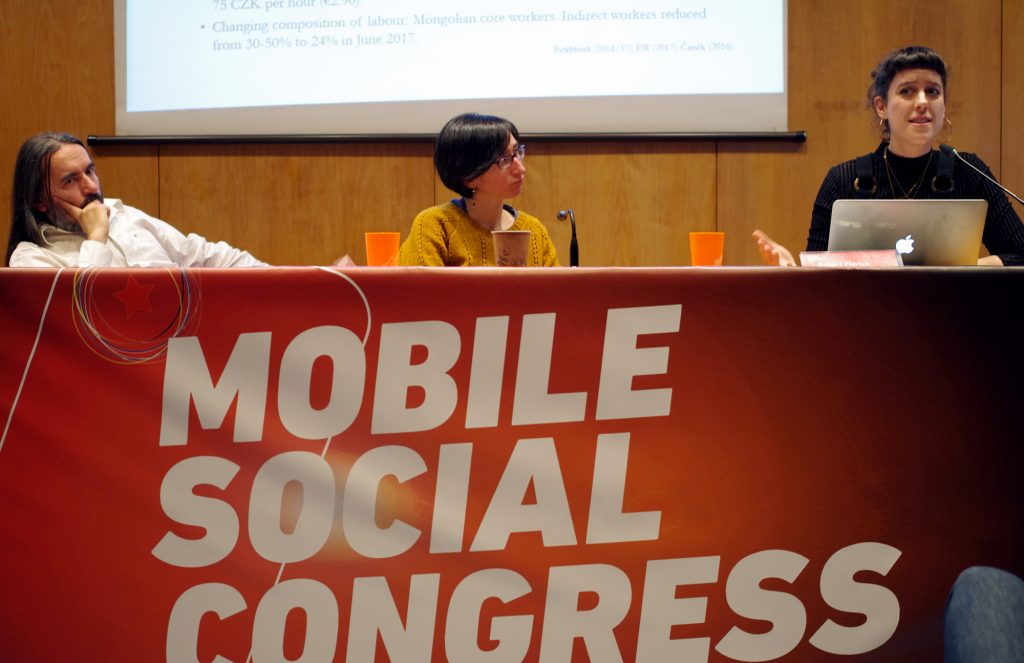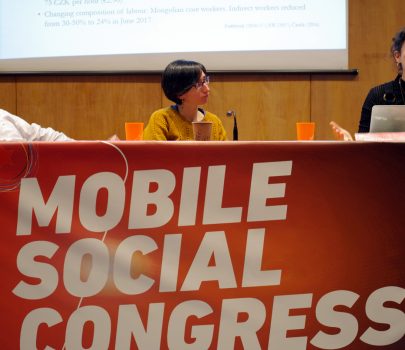
- The report, prepared by the Economic Rights Institute and Electronics Watch, is based on the study of 167 suicide cases, in-depth interviews with 252 employees from four factories and surveys of 5,592 others.
- The Mobile Social Congress comes to a close this Wednesday with a panel discussion on responsible public purchasing, and another on reusing and recycling electronic devices.
Dimitri Kessler, a researcher with the Economic Rights Institute, presented a report on the connection between suicide and working conditions in the electronics industry this Wednesday at the Mobile Social Congress (MSC). This was part of the first day of the MSC, organized by SETEM Catalunya and held at Pati Manning in Barcelona. The MSC will last until this Wednesday, and takes place at the same time as the Mobile World Congress (MWC).
Kessler spoke via videoconference from China, where he is studying working conditions in the electronics industry. His presentation was part of the panel discussion “Modern slavery, forced labour and suicides in the electronics industry”. The report he presented, prepared by the Economic Rights Institute and Electronics Watch, links working conditions and suicide among factory workers in the electronics industry in China. It shows that suicides have occurred not only at Foxconn (the world’s largest contract manufacturer of electronics and the main supplier for brands like Apple), but also at other companies.
The report notes that one of the main causes of suicides in Chinese electronics factories is suicide used as a form of collective protest. 48% of suicides seek to pressure companies to respect employees’ working conditions or as a protest against aggressive supervisors and security. Obligatory overtime and long workdays also place workers in a climate of constant tension. Economic pressure plays its part as well, as workers are subjected to fines and denied medical coverage in case of workplace accidents; furthermore, companies often refuse to accept employees’ resignations. Gender violence is also a risk factor associated with suicide, as 16% of cases involve men who commit suicide after the death of their partners or ex-partners.
The report is based on public reports on 167 suicide cases, in-depth interviews with 252 employees from 4 electronics factories and surveys involving 5,592 employees from 44 suppliers. According to the Economic Rights Institute and Electronics Watch, the report does not seek to single out any company in particular, but to associate suicides in the workplace with working conditions; they note that the only way to solve this issue is through collaboration between companies, the Chinese Government, civil society and other experts.
The Mobile Social Congress began this Tuesday with a showing of the documentary “Projecte Mòbil”, which denounces the social and environmental impacts of the electronics industry. This was followed by a panel discussion made up of David Llistar, director of Global Justice at the Barcelona City Council; Mireia Roura from eReuse; Laia Fargas Fursa from SETEM Catalunya, coordinator of the Mobile Social Congress; Wouter Tebbens from Fem ProComuns and Griselda Casadellà from the Eticas Foundation. All panel members emphasized the serious social and environmental impacts of the electronics industry, and the need to change both our current model of production and of consumption.
Along the same lines, the first two discussions at the Mobile Social Congress looked at specific cases of environmental and labour rights violations in different parts of the world. Participants discussed mining to supply the electronics industry, with cases from Chile, Zambia and Armenia, or exploitation in factories in China and in EU countries such as the Czech Republic or Hungary. One of the conclusions of MSC participants was the need for responsible contracting by companies, and especially by public administrations in the global North, which can help to improve working conditions both in mines and in factories.
The Mobile Social Congress comes to a close this Wednesday with two final panel discussions. One will address responsible public purchasing, while the other will discuss recycling and reusing electronic devices. The workshop held Tuesday addressed recycling and reusing devices as well as free software, and included a simultaneous restart party and install party. The second day of the Mobile Social Congress will also include three workshops that aim to take a more practical look at the impact of the electronics industry, as well as how the social and solidarity economy is already applying new models for production and, especially, consumption.


